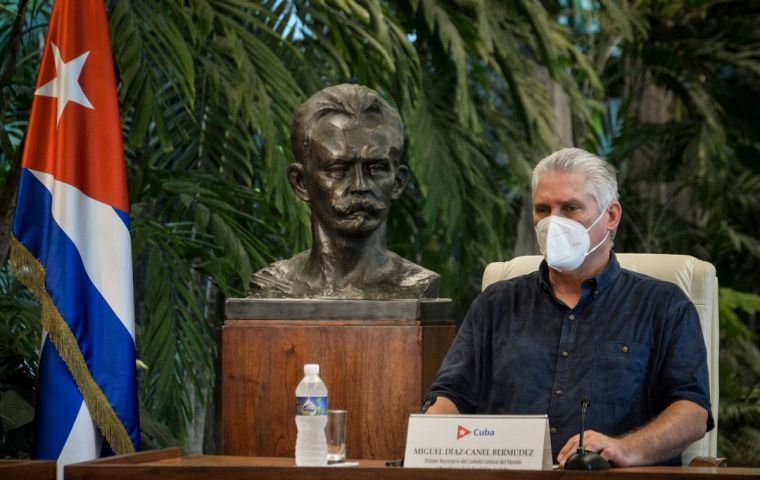MercoPress. South Atlantic News Agency
Social media filled with rumors about situation in Cuba as government shuts down internet
 Díaz-Canel insisted that the United States was behind Sunday's historical demonstrations.
Díaz-Canel insisted that the United States was behind Sunday's historical demonstrations. Little has been known outside Cuba about the situation in the country following Sunday's nationwide protests against the government of President Miguel Díaz-Canel due to shortages of food, electricity and medicines.
Díaz-Canel called all Communists on the island to defend his regime on Sunday and little after that people had no access to the internet and no official information became available.
But rumours did go viral on social media together with some video footage which -if authentic- would corroborate what is mostly speculation and guesses.
The President's appeal for his fellow Communists to defend the revolution would signal the Government's own doubts about whether the current situation can be controlled by force, given the chances of appeasing the people's demands by giving in to some of them seem to be out of the question.
In addition to that, and according to social media postings, the Cuban regime has been press-ganging teenagers into a repressive force, in a move to both strengthen its own units while depriving the populace of potential protesting or fighting power.
Uncorroborated social media postings also mentioned former Cuban President and former First Secretary of Cuba's Communist Party Raúl Castro has left the island and sought shelter in Venezuela, while one of his daughters has been reportedly sighted in Miami with her partner.
Cuban dissidents living in the United States were also said on Twitter to have left for the island with arms and equipment to stage a military revolt.
But all these are just social media postings, fuelled by the internet blackout in Cuba where according to EFE, no new demonstrations had been reported by 3 pm Monday.
Uruguayan President Luis Lacalle Pou Monday said Cuba was “a dictatorship which does not respect human rights“ and also called on the international community to raise a voice in that regard, but meddling in the internal affairs of the country.
On the other hand, Argentine President Alberto Fernández demanded an end to the trade blockade against Cuba -which he described as “inhumane”- and opposed any foreign intervention.
”There is nothing more inhumane in a pandemic than to block a country economically,“ Fernández said in a radio interview. He added that ”keeping it blocked in the middle of a pandemic is the least humanitarian thing there is.“
The United States has maintained a strict embargo on the island since 1962, which, according to the Cuban authorities, is the main cause of the great economic problems of the island.
Díaz-Canel insisted on Monday that the United States was behind Sunday's historical demonstrations.
Fernández also said that ”it is not Argentina or any country in the world” that needs to tell Cuba how to handle their own crisis. “We have to promote peace among the peoples and find dialogue and ways out.” It is what I always raise about Venezuela, ”said the Argentine president.
The Argentine President also cited the case of Venezuela, where the intervention of any third country into the internal affairs under the Nicolás Maduro regime would be a solution to the serious human rights violations denounced in a recent report by UN High Commissioner for Human Rights Michelle Bachelet.
By the same token, “I was against what they did with (former Bolivian president) Evo Morales, the OAS (Organization of American States) and those who endorsed (Jeanine) Añez's coup” in 2019, Fernández stressed.




Top Comments
Disclaimer & comment rulesCommenting for this story is now closed.
If you have a Facebook account, become a fan and comment on our Facebook Page!